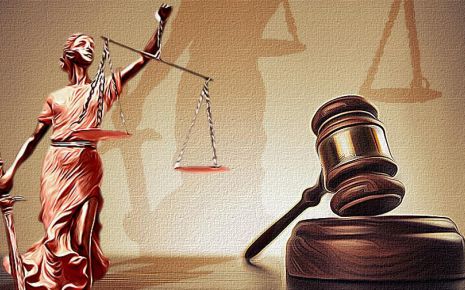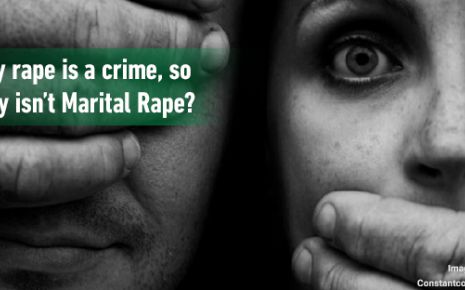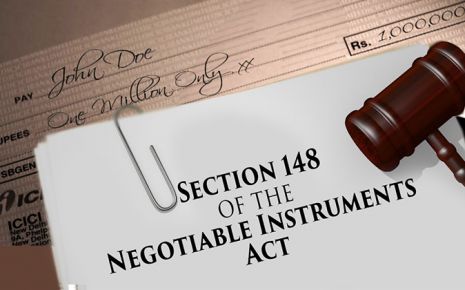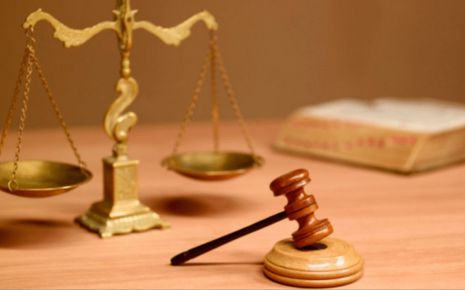Net Access Is Constitutionally Protected Right; SC
Declaring that access to the Internet is a constitutionally protected right
under Article 19 (1)(a) of Constitution of India, the Supreme Court ordered the
Jammu & Kashmir Administration to review within a week all orders imposing curbs
in the newly created Union Territory following nullification of Article 370 of
Constitution of India.
The freedom of speech and expression and the freedom to practice any profession
or carry on any trade, business or occupation over the medium of internet enjoys
constitutional protection under Article 19 (1)(a) and Article 19 (1)(g) of
Constitution of India. The restriction upon such fundamental rights should be in
consonance with the mandate under Article 19 (1)(a) and Article 19 (2) and
(6) of the Constitution, inclusive of the test of proportionality. ruled Three
Judge Bench headed by Justice N. V. Ramana.
Article 19 (6) empowers the State to make laws to lay down the professional or
technical qualifications necessary for practicing any profession or carrying on
any occupation, trade or business. It also authorises the State or a Corporation
owned or controlled by the State to carry on any trade, business, industry or
service whether to the exclusion, complete or partial, of citizens or otherwise.
The Bench which also included Justice B. R. Gavai and Justice R. Subhash Reddy
ordered the Jammu & Kashmir Administration to restore Internet Services in the
institutions providing essential services like hospitals and educational places.
- An order suspending internet services indefinitely is impermissible under the Temporary Suspension of Telecom Services (Public Emergency or Public Service) Rules, 2017.
- Suspension can be utilized for temporary duration only.
- Any order suspending internet issued under the Suspension Rules, must adhere to the principle of proportionality and must not extend beyond necessary duration.
- Any order suspending internet under the Suspension Rules is subject to judicial review based on the parameters set out herein.
The Bench said, as it directed the authorities to review forthwith all orders
suspending Internet Services and revoke orders not in consonance with its order.
The mobile phones which were unheard of once and later a luxury has now become
part and parcel of the day to day life and even to a stage that it is
unavoidable to survive with dignity and freedom. Though initially it was a mere
replacement of land phone enabling one to connect another and talk, on
the advent of internet the connectivity became so wide. On availability of more
and more facilities, since the year 1998, the number of users gradually
increased and as at present India stands 2nd in the world in the usage of
Internet.
The facilities to access Internet, which was initially possible only through
desk top computers, later in laptop, is now available in mobile
phones which are handy and portable; with more and more applications,
connectivity became feasible for everyone everywhere even among the common man.
Apart from the facilities to read E-news papers, e-books, etc. one can undergo
Online Courses also sitting at home or hostel and there are courses under SWAYAM
recognized by the University Grants Commission, which students can undergo even
when they are undergoing regular studies in colleges.
There is no gainsaying that in today’s world the Internet stands as the most
utilized and accessible medium for exchange of information. The revolution
within the cyberspace has been phenomenal in the past decade, wherein, the
limitation of storage space and accessibility of print medium has been remedied
by the usage of internet.
The genesis of the issue starts with the Security Advisory issued by the Civil
Secretariat, Home Department, Government of Jammu & Kashmir, advising the
tourists and the Amarnath Yatris to curtail their stay and make arrangements for
their return in the interest of safety and security. Subsequently, Educational
Institutions and Offices were ordered to remain shut until further orders. On
August 04, 2019, Mobile Phone Networks, Internet Services, and Landline
Connectivity were all discontinued in the Valley, with restrictions on movement
also being imposed in some areas.
On August 05, 2019, Constitutional Order 272 was issued by the President of
India, applying all provisions of the Constitution of India to the State of
Jammu & Kashmir, and modifying Article 367 of Constitution of India in its
application to the State of Jammu & Kashmir. In light of the prevailing
circumstances, on the same day, the District Magistrates, apprehending breach of
peace and tranquillity, imposed restrictions on movement and public gatherings
by virtue of powers vested under Section 144 Cr. P. C. Due to the aforesaid
restrictions, the Petitioner in W. P. (C) No. 1031 of 2019 claims that the
movement of journalists was severely restricted and on 05.08.2019, the Kashmir
Times Srinagar Edition could not be distributed. The Petitioner has submitted
that since 06.08.2019, she has been unable to publish the Srinagar edition of
Kashmir Times pursuant to the aforesaid restrictions.
Aggrieved by the same, the Petitioners (Ms. Anuradha Bhasin & Mr. Ghulam Nabi
Azad) approached Supreme Court under Article 32 of the Constitution of India
seeking issuance of an appropriate writ for setting aside or quashing any and
all order (s), notification (s), direction (s) and/or circular (s) issued by the
Respondents under which any/all modes of communication including internet,
mobile and fixed line telecommunication services have been shut down or
suspended or in any way made inaccessible or unavailable in any locality.
Further, the Petitioners sought the issuance of an appropriate writ or direction
directing Respondents to immediately restore all modes of communication
including mobile, internet and landline services throughout Jammu & Kashmir in
order to provide an enabling environment for the media to practice its
profession. Moreover, the Petitioner in W. P. (C) No. 1031 of 2019 also pleaded
to pass any appropriate writ or direction directing the Respondents to take
necessary steps for ensuring free and safe movement of reporters and journalists
and other media personnel. Lastly, she also pleaded for the framing of
guidelines ensuring that the rights and means of media personnel to report and
publish news is not unreasonably curtailed.
Moreover, Mr. Ghulam Nabi Azad (Petitioner in W.P. (C) No. 1164 of 2019),
alleges that he was stopped from travelling to his constituency in Jammu and
Kashmir. In this context, he alleges that due to the aforesaid restrictions, he
is not able to communicate with the people of his constituency.
Petitioners Counsel argued that the State had not indicated as to the necessity
to block landline services. He further submitted that the
Communications/Internet restrictions which were imposed under the Indian
Telegraph Act, 1885, needs to follow the provisions of Section 5 of the
Telegraph Act, in line with Article 19 of Constitution of India. The internet
restrictions, not only impact the right to free speech of individuals but also
impinges on their right to trade.
Therefore, a less restrictive measure, such as restricting only social media
websites like Facebook and Whatsapp, should and could have been passed, as has
been done in India while prohibiting human trafficking and child pornography
websites. While there can be some restrictions, there can be no blanket orders,
as it would amount to a complete ban. Instead, a distinction should be drawn
while imposing restrictions on social media/mass communication and the general
internet. These restrictions need to be tested on the anvil of the test of
proportionality.
Supreme Court confided itself to the following amongst other issues, inter
alia;
- Whether the freedom of speech and expression and freedom to practise any profession, or to carry on any occupation, trade or business over the Internet is a part of the fundamental rights under Part III of the Constitution?
- Whether the Government’s action of prohibiting internet access is valid?
The Supreme Court observed that the advancements in the field of technology
have to be recognized.
24. Law and technology seldom mix like oil and water. There is a consistent
criticism that the development of technology is not met by equivalent movement
in the law. In this context, we need to note that the law should imbibe the
technological development and accordingly mould its rules so as to cater to the
needs of society.
Non recognition of technology within the sphere of law is only a disservice to
the inevitable. In this light, the importance of internet cannot be
underestimated, as from morning to night we are encapsulated within the
cyberspace and our most basic activities are enabled by the use of internet.,
observed in Para No. 24 of the Judgment authored by Justice N. V. Ramana.
The Judgment noted that the SC in a catena of judgments has recognized free
speech as a fundamental right, and, as technology has evolved, has recognized
the freedom of speech and expression over different media of expression. This
was based on the precedents Odyssey Communications Pvt. Ltd. v. Lokvidayan
Sanghatana, (1988) 3 SCC 410 , Secretary, Ministry of Information &
Broadcasting, Government of India etc.
In this background, it observed as under;
26. The development of the jurisprudence in protecting the medium for expression
can be traced to the case of Indian Express Vs Union of India, (1985) 1
SCC 641, wherein, this Court had declared that the freedom of print medium is
covered under the freedom of speech and expression.
In Odyssey Communications Pvt. Ltd. Vs Laokvidayan Sanghatana, (1988) 3
SCC 410, it was held that the right of citizens to exhibit films on Doordarshan,
subject to the terms and conditions to be imposed by the Doordarshan, is a part
of the fundamental right of freedom of expression guaranteed under Article 19
(1)(a), which can be curtailed only under circumstances set out under Article 19
(2).
Further, this Court expanded this protection to the use of airwaves in the case
of Secretary, Ministry of Information & Broadcasting, Government of India
(supra). In this context, we may note that this Court, in a catena of judgments,
has recognized free speech as a fundamental right, and, as technology has
evolved, has recognized the freedom of speech and expression over different
media of expression.
Expression through the internet has gained contemporary relevance and is one of
the major means of information diffusion. Therefore, the freedom of speech and
expression through the medium of internet is an integral part of Article 19
(1)(a) and accordingly, any restriction on the same must be in accordance
with Article 19 (2) of the Constitution.
Internet important tool for trade and commerce
The Supreme Court noted that the internet is also a very important tool for
trade and commerce.
It was held;
27. In this context, we need to note that the internet is also a very important
tool for trade and commerce. The globalization of the Indian economy and the
rapid advances in information and technology have opened up vast business
avenues and transformed India as a global IT hub. There is no doubt that there
are certain trades which are completely dependent on the internet. Such a right
of trade through internet also fosters consumerism and availability of choice.
Therefore, the freedom of trade and commerce through the medium of the internet
is also constitutionally protected under Article 19 (1)(g)), subject to the
restrictions provided under Article 19 (6).
Occurrence of Public Emergency or interests of public safety are
pre-requisites for shutdown
The procedural mechanism contemplated for restrictions on the Internet, is
twofold: first is contractual, relating to the contract signed between Internet
Service Providers and the Government, and the second is statutory, under
the Information Technology Act, 2000; Criminal Procedure Code, 1973 and Indian
Telegraph Act,1885.
Section 69-A of the Information Technology Act, 2000 read with the Information
Technology (Procedures and Safeguards for Blocking for Access of Information by
Public) Rules, 2009 allows blocking of access to information.
Prior to 2017, any
measure restricting the internet generally or even shutting down the internet
was passed under Section 144 of Code of Criminal Procedure Code, 1973, a general
provision granting wide powers to the Magistrates specified therein to pass
orders in cases of apprehended danger.
The position has changed since 2017, with the passage of the Temporary
Suspension of Telecom Services (Public Emergency or Public Safety) Rules 2017
issued under Section 7 of the Indian Telegraph Act, 1885. With the promulgation
of the Suspension Rules, the States are using the aforesaid Rules to restrict
telecom services including access to the internet.
92.....what emerges is that the pre requisite for an order to be passed under
this subsection, and therefore the Suspension Rules, is the occurrence of a public
emergency or for it to be in the interest of public safety. Although the
phrase public emergency has not been defined under the Telegraph Act, it has
been clarified that the meaning of the phrase can be inferred from its usage in
conjunction with the phrase in the interest of public safety following it.
Referring to Rule 2 (2) of the Suspension Rules, it was held that the reasoning
of the authorised officer in the internet shutdown order should not only
indicate the necessity of the measure but also what the unavoidable
circumstance was.
The purpose of the aforesaid rule is to integrate the proportionality analysis
within the framework of the Rules.
99. Lastly, we think it necessary to reiterate that complete broad suspension of
telecom services, be it the Internet or otherwise, being a drastic measure, must
be considered by the State only if ‘necessary’ and ‘unavoidable’. In furtherance
of the same, the State must assess the existence of an alternate less intrusive
remedy. Having said so, we may note that the aforesaid Suspension Rules have
certain gaps, which are required to be considered by the legislature.
Indefinite suspension of internet not permissible
The Court passed the following directions in relation to internet shutdown:
- An order suspending internet services indefinitely is impermissible under the Temporary Suspension of Telecom Services (Public Emergency or Public Service) Rules, 2017.
- Suspension can be utilized for temporary duration only. d. Any order suspending internet issued under the Suspension Rules, must adhere to the principle of proportionality and must not extend beyond necessary duration.
- Any order suspending internet under the Suspension Rules is subject to judicial review based on the parameters set out herein.
Court reads into provisions for periodic review into the Suspension Rules
The Court noted a gap in the Suspension Rules as it did not provide for a
periodic review of the suspension of internet.
The existing Suspension Rules neither provide for a periodic review nor a time
limitation for an order issued under the Suspension Rules. Till this gap is
filled, we direct that the Review Committee constituted under Rule 2(5) of the
Suspension Rules must conduct a periodic review within seven working days of the
previous review, in terms of the requirements under Rule 2(6), the Bench
ordered.
The Bench ultimately directed the J&K Administration to review all orders
suspending internet services forthwith. h. Orders not in accordance with the law
laid down above, must be revoked.
Further, in future, if there is a necessity to pass fresh orders, the law laid
down herein must be followed.
In case the Government is choosing not to restore internet in any regions, it
should consider allowing certain websites, such as government websites, such as
government websites, localized/limited e-banking facilities, hospital services
and other essential services in such regions.
It was said;
In any case, the State/concerned authorities are directed to consider forthwith
allowing government websites, localized/limited e-banking facilities, hospitals
services and other essential services, in those regions, wherein the internet
services are not likely to be restored immediately.
Important to note that the Court has not expressed any opinion on the right to
access internet and has clarified that the judgment is confined to the point of
the use of internet as a tool for exercise of freedom of speech and expression
and trade and commerce. The internet’s role in nudging a shift from a
resource-based economy to a knowledge-based economy, as well as the resulting
socio-economic benefits is well acknowledged.
Written By: Dinesh Singh Chauhan, Advocate, J&K High Court of Judicature,
Jammu.
Email: [email protected], [email protected]
Law Article in India
Legal Question & Answers
Lawyers in India - Search By City
LawArticles
How To File For Mutual Divorce In Delhi

How To File For Mutual Divorce In Delhi Mutual Consent Divorce is the Simplest Way to Obtain a D...
Increased Age For Girls Marriage

It is hoped that the Prohibition of Child Marriage (Amendment) Bill, 2021, which intends to inc...
Facade of Social Media

One may very easily get absorbed in the lives of others as one scrolls through a Facebook news ...
Section 482 CrPc - Quashing Of FIR: Guid...

The Inherent power under Section 482 in The Code Of Criminal Procedure, 1973 (37th Chapter of t...
The Uniform Civil Code (UCC) in India: A...

The Uniform Civil Code (UCC) is a concept that proposes the unification of personal laws across...
Role Of Artificial Intelligence In Legal...

Artificial intelligence (AI) is revolutionizing various sectors of the economy, and the legal i...







Please Drop Your Comments